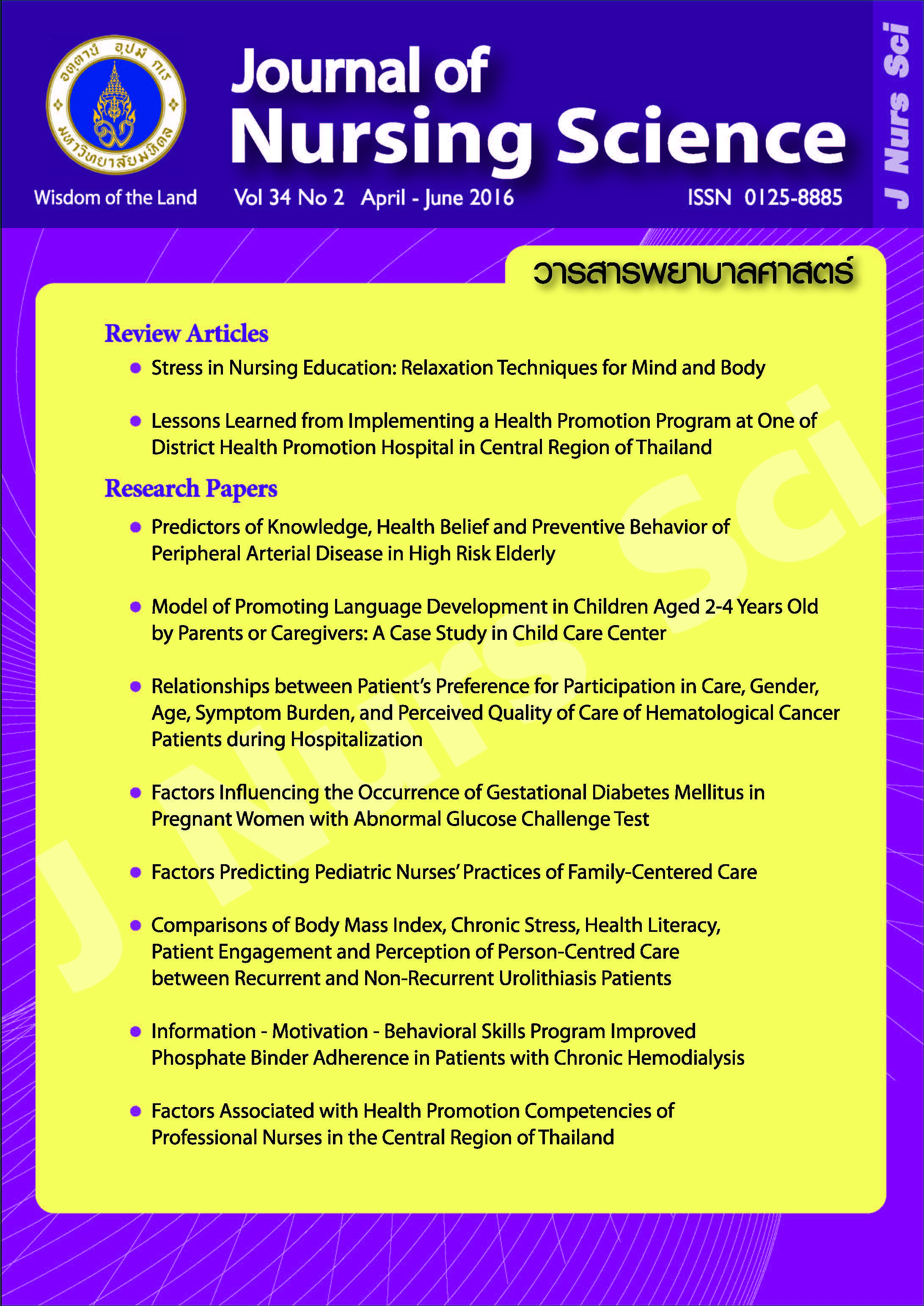Relationships between Patient’s Preference for Participation in Care, Gender, Age, Symptom Burden, and Perceived Quality of Care of Hematological Cancer Patients during Hospitalization
Main Article Content
Abstract
Abstract
Purpose: To investigate the relationships between patients’ preference for participation in care, gender, age, symptom burden, and perceived quality of care of hematological cancer patients during hospitalization.
Design: Descriptive correlational research.
Methods: The study sample consisted of 50 hematological cancer patients who were admitted in one university hospital in Bangkok, Thailand. Subjects were recruited by purposive sampling. Data were
collected using 1) Demographic and Disease-related Characteristics Questionnaire, 2) The Control Preference Scale, 3) Memorial Symptom Assessment Scale-Global Distress Index, and 4) Quality of care
from Patients’ Perspective. Data were analyzed using descriptive statistics, Point Bi-serial, Spearman’s rank correlation.
Main findings: Patients’ age ranged from 18 to 78 years (mean = 47.14) and 64.0% were males. The most prevalent physical and psychological symptoms were dry mouth (54.0%) and worry (38.0%) respectively. Approximately one-third of patients (34.0%) preferred adopting a passive-shared role (the doctors and nurses make the decision after considering the patient’s opinion). Subjects perceived quality of care at the level of good and very good (44% and 38% respectively). Perception of quality of care was significantly correlated with distressing symptom of lack of appetite (r = .318, p < .05) and feeling irritable (r = .288, p < .05). Women perceived higher quality of care than men in medicaltechnical competence dimension, (r = .351, p < .05) and physical-technical conditions (r = .385, p < .05)
Conclusion and recommendations: Oncology nurses should be aware of gender-related factors and symptom burden on quality of care improvement that must be evaluated on the patient’s perspective.
Keywords: quality of care, patient’s preference for participation in care, gender, age, symptom burden
ความสัมพันธ์ระหว่างความต้องการมีส่วนร่วมในการดูแล เพศ อายุ การรบกวนจากอาการ และการรับรู้คุณภาพการดูแลของผู้ป่วยมะเร็งโลหิตวิทยาระหว่างรับการรักษาในโรงพยาบาล
บทคัดย่อ
วัตถุประสงค์: ศึกษาความสัมพันธ์ระหว่างความต้องการมีส่วนร่วมในการดูแล เพศ อายุ การรบกวนจากอาการ และการรับรู้คุณภาพการดูแลของผู้ป่วยมะเร็งโลหิตวิทยาระหว่างรับการรักษาในโรงพยาบาล
รูปแบบการวิจัย: ศึกษาความสัมพันธ์เชิงพรรณนา
วิธีดำเนินการวิจัย: กลุ่มตัวอย่างเป็นผู้ป่วยมะเร็งโลหิตวิทยาที่เข้ารับการรักษาแบบผู้ป่วยในของโรงพยาบาลมหาวิทยาลัยแห่งหนึ่งในกรุงเทพฯ จำนวน 50 ราย เลือกกลุ่มตัวอย่างแบบเจาะจง รวบรวมข้อมูลโดยใช้แบบสอบถามข้อมูลส่วนบุคคล แบบสอบถามความต้องการมีส่วนร่วมในการจัดการอาการ แบบประเมินอาการที่พบบ่อยในโรคมะเร็ง10 อาการ และแบบประเมินคุณภาพการดูแลในมุมมองของผู้ป่วย วิเคราะห์ข้อมูลโดยใช้สถิติเชิงพรรณนา ค่าสหสัมพันธ์สเพียร์แมนและพอยท์ไบซีเรียล
ผลการวิจัย: กลุ่มตัวอย่างมีอายุระหว่าง 18-78 ปี เฉลี่ย 47.14 ปี (SD = 14.94) เป็นเพศชายร้อยละ 64.0 อาการด้านร่างกายที่พบมากที่สุด ได้แก่ อาการปากแห้ง (ร้อยละ 54.0) และด้านจิตใจ ได้แก่ กังวล/กลุ้มใจ (ร้อยละ 38.0) ระดับความต้องการมีส่วนร่วมในการดูแลที่กลุ่มตัวอย่างเลือกมากที่สุด (ร้อยละ 34.0) คือ passive-shared และรับรู้คุณภาพการดูแลในระดับดีและดีมาก (ร้อยละ 44 และ 38 ตามลำดับ) ผลการวิเคราะห์ความสัมพันธ์พบว่า การรับรู้คุณภาพการดูแลโดยรวมสัมพันธ์กับการรบกวนจากอาการเบื่ออาหาร (r = .318, p < .05) และอาการหงุดหงิด (r = .288, p < .05) เพศหญิงรับรู้คุณภาพการดูแลสูงกว่าเพศชายในด้าน Medical-technical competence (r = .351, p < .05) และด้านPhysical-technical conditions (r = .385, p < .05)
สรุปและข้อเสนอแนะ: พยาบาลควรตระหนักถึงความสำคัญของปัจจัยด้านเพศ และการรบกวนจากอาการต่อการพัฒนาคุณภาพการดูแลผู้ป่วยมะเร็งซึ่งควรประเมินจากมุมมองของผู้ป่วยเป็นฐาน
คำสำคัญ: คุณภาพการดูแล ความต้องการมีส่วนร่วมในการดูแล เพศ อายุ การรบกวนจากอาการ
Article Details
Copyright Notice: Nursing Science Journal of Thailand has exclusive rights to publish and distribute the manuscript and all contents therein. Without the journal’s permission, the dissemination of the manuscript in another journal or online, and the reproduction of the manuscript for non-educational purpose are prohibited.

Disclaimer: The opinion expressed and figures provided in this journal, NSJT, are the sole responsibility of the authors. The editorial board bears no responsibility in this regard.


